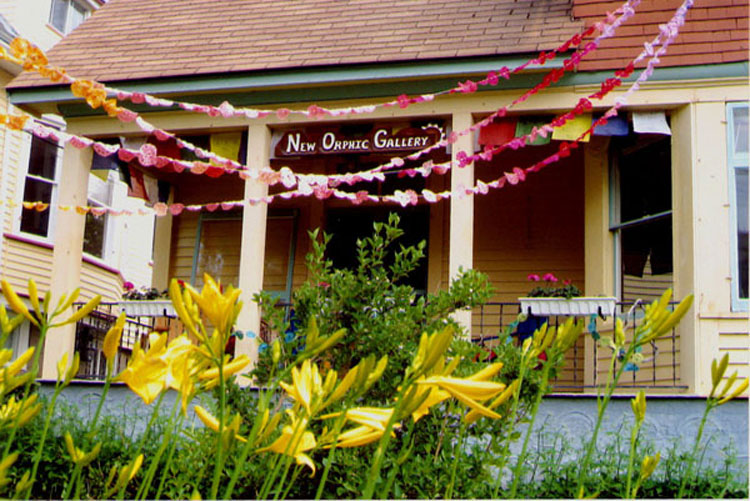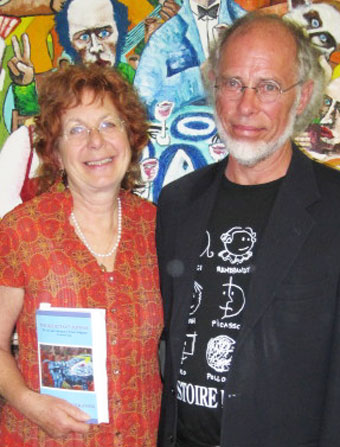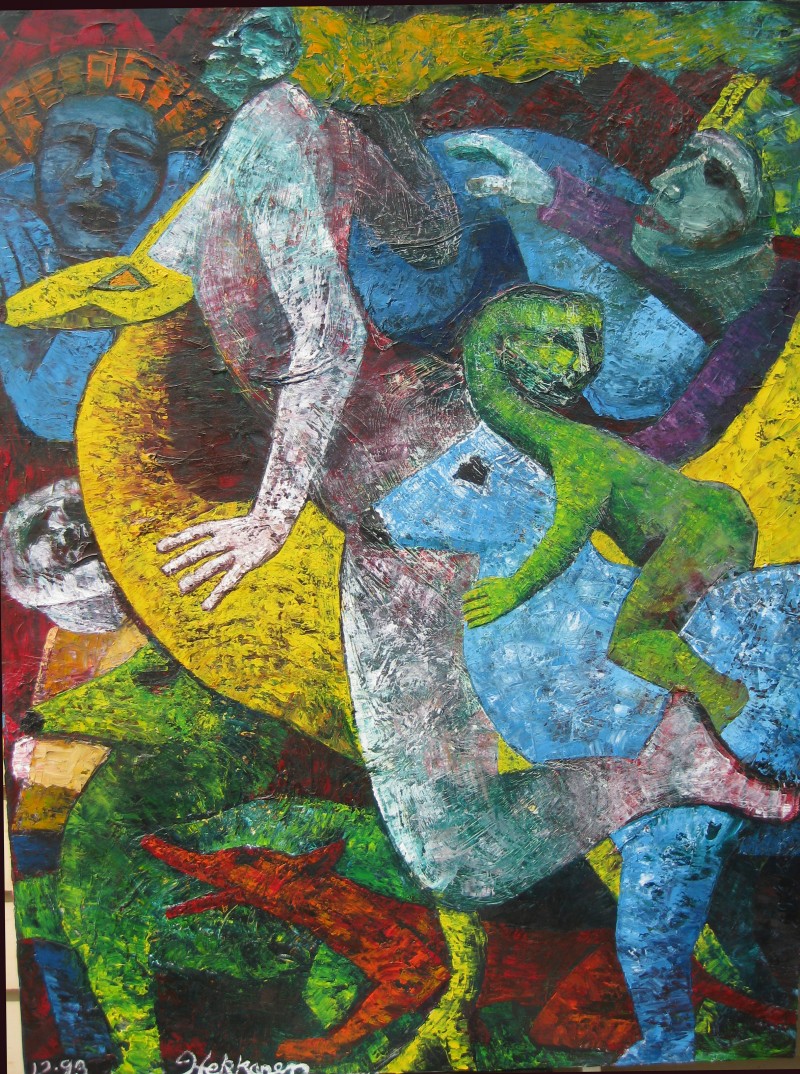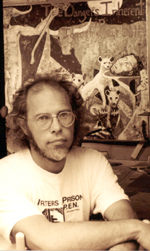#246 The heroism of the outsider
February 11th, 2018

Novelist Bill Gaston once dubbed Ernest Hekkanen Canadian literature’s “most resolute maverick.” For twenty years he and his long-time partner Margrith Schraner resolutely published a lively and sophisticated literary periodical, New Orphic Review, without any government funding.
Upon relocating from Vancouver to Nelson in the Kootenays, Hekkanen and Schraner also began co-curating their home-based New Orphic Gallery. Their issues of New Orphic nearly always included erudite, opening editorials by Hekkanen; the covers featured artwork and collages by Hekkanen or Schraner, who co-authored Black Snow: An Imaginative Memoir.
New Orphic Review was published twice each year until 2017. It suited Hekkanen to function as an outsider–even keeping at a distance from the writers he published. “I think I might have a personality disorder that doesn’t allow me to forge close friendships,” he says.
*
ORMSBY: Publishing a literary magazine in Canada without a drop of public funding is a bit like Van Gogh selling only one painting in his lifetime – to his brother. Are you mad?
HEKKANEN: I don’t think one has to be mad to publish a literary magazine without any public funding, although madness might make the adventure more exciting. I think being sufficiently desperate is a better motivating factor. By the late 1980s, I had received three publishing contracts from two different houses, one of which fell through, although I did receive my advance in full. Now and then a literary magazine would pick up one of my stories, but infrequently. I started self-publishing my books, and then I thought: why not add some scope and dimension to my delusions. To create a product of no obvious practical value, and for which there would be an extremely limited market, if any at all, seemed to me an act of defiance worth pouring some hard-earned cash into. And so, I began to publish The New Orphic Review—on a shoestring. On second thought, maybe that would qualify as madness.
SCHRANER: I would say Ernest was perfectly suited to the task. Publishing a literary journal gave him a chance to employ his talents as a writer, editor, visual artist and tradesman. He typed and photocopied, collated individual pages, did lay-out and designed magazine covers, hand-bound each copy using glue and thread, took care of all correspondence with the authors, took care of distribution and accounting, too. The noble task of copy-editing and proofreading fell to me. I admit that publishing times were kind of mad.
*
ORMSBY: Naming a publication is a bit like naming a child. It’s actually a literary undertaking. Have you always been satisfied with the name of your publication?
HEKKANEN: Back when Margrith Schraner and I started our journal, I was researching Pythagoras and the Orphics—not seriously but with some avid interest. Pythagoras is credited with the Pythagorean theorem. One of the highly touted disciplines in Orphism revolved around ‘theory,’ which, according to an explanation in Bertrand Russell’s History of Western Philosophy, meant something closer to “passionate sympathetic contemplation,” a practice that can be quite useful for writers who are trying to get inside a character’s heart and mind. Later I learned that Guillaume Apollinaire referred to certain artists as Orphists. Many of those artists took exception to the label. But given what I had learned, I decided to give our review a sense of lineage by naming it The New Orphic Review.
SCHRANER: Don’t forget that Pythagoras is the patron saint of The New Orphic Review. His likeness appears on the title page of every issue. Friends once referred to the literary magazine as our love-child. We affectionately came to refer to it as the NOR. The name had a decisively postmodern ring to it, which I liked.
*
ORMSBY: Have you felt a paternalist or maternalist pleasure fostering the writers; or would you say your approach has been more fraternal or sisterly?
HEKKANEN: I don’t think I’m capable of having paternal or maternal pleasure when it comes to fostering writers. I really enjoyed it when a good short story or series of poems arrived in the mail. I considered our journal to be a ‘starter’ magazine, a place where writers could get their first publishing credits, and go on from there. It was an immense pleasure when anthologies like Journey Prize Stories or Best American Mystery Stories later picked up something we had published. “Oh,” I would think, “what I’m doing isn’t completely futile, after all.”
SCHRANER: In fact, he did help foster me as a writer. Without his invaluable suggestions and support, my first short story wouldn’t have made it into the Journey Prize Anthology. My work ended up being featured in 26 of the 40 issues of the NOR.
*
 ORMSBY: When you receive a particularly fine submission from a writer you don’t know, is your inclination to get to know them? Or do you generally prefer to remain at a distance?
ORMSBY: When you receive a particularly fine submission from a writer you don’t know, is your inclination to get to know them? Or do you generally prefer to remain at a distance?
HEKKANEN: I generally remain at a distance from contributors to the NOR. I don’t mind being of benefit to them, if they want me to write a recommendation or something like that, which I’ve done quite a few times. I think I might have a personality disorder that doesn’t allow me to forge close friendships. I do know that I have an oppositional disorder. In fact, I once wrote an editorial entitled “Literature as an Oppositional Disorder”. Without that malady, though, I wouldn’t have pursued literature for over fifty years. When one’s career has produced more lead than gold, one needs to have some inner fortitude.
SCHRANER: I should remind the editor-in-chief that some of the contributors to the NOR were colleagues and friends. Contributors are part of the ephemeral, international community that tells us, “Yes, we’re still here.”
*
ORMSBY: When you were growing up, at what point did you begin to realize that in some way your life would have to entail some sort of literary pursuit?
HEKKANEN: When puberty hit, and hit hard, something happened to me that distanced me from other people my age. I lost the ability to be chummy. Although I was an avid but mediocre athlete, I found I couldn’t identify with those around me. People seemed to be participating in a drama I couldn’t relate to. I looked at people as though they were specimens, and had their destinies written on their foreheads. Which is not to say I was bookish, not at all. I read the required novels in high school and sometimes came up with satisfactory insights, according to my teachers. In Grade 11, I think it was, my English teacher required us to keep a journal, which we had to turn over to her every few weeks. She often complimented me on my observations, and I think I might have picked up the writing bug at that time.
SCHRANER: I have always loved literature. Upon my immigration from Switzerland in 1969, I struggled to attain proficiency in the English language. I took night classes and eventually obtained a degree in English literature at Simon Fraser University. Meeting Ernest Hekkanen was a literary dream come true.
*
ORMSBY: Were there any particular writers or books that inspired you?
HEKKANEN: It wasn’t until I read an article about the then current crop of existentialist writers in Life magazine, and purchased at copy of Camus’s novel, The Stranger, that I came to think I might pursue a writing career. The character of Meursault seemed to be just like me. He seemed to suffer from the same malady, although he had more friends and associates than did I. I subsequently read Malraux and Sartre, James Baldwin and Norman Mailer. Then I took a writing class from Jack Cady at the University of Washington, and some of the stories I wrote for his class ended up getting published in literary magazines. In other words, I became a fish hooked through the gills.
SCHRANER: Among my creative role models were Simon de Beauvoir and Jean-Paul Sartre as well as Gertrude Stein. I always wanted to have a literary salon, and still dream of it. The Living Room Series at our home on Victoria Drive in Vancouver came close to it. I think that our present abode in Nelson—literary landmark #123 on the Literary Map of B.C.—has venue potential, but not in the winter, when the snow and ice can be a real hazard.
*
ORMSBY: So now that you’ve had decades to think about it, what are the psychological origins for your love of literature?
HEKKANEN: I think I’ve already answered this question. But I’ll add a few remarks. Writing became a psychological crutch for me. It allowed me to get through some pretty rough years, especially after relocating to Canada in 1969, at age 22. Having to establish a life for myself was the most rigorous teacher I ever had. One of my first jobs in Canada was digging a well by hand. By the time I got to the bottom of that, I knew there was only one way to go, and that was back up. Here, in Canada, I estimate I’ve had over 35 jobs, most of them self-employed, and underpaid. Writing became my safety ring. It kept my head above water.
SCHRANER: My love of literature survived the psychological stress of immigration—it crossed continents and became re-rooted or rather transplanted, then grew in a different language, culture and sensibility. I originally wanted to pursue a degree in psychology, but lacked the necessary scientific stamina. Settling on the study of English and French literature was a decision I have never regretted. It was perfect for me, in fact.
*
ORMSBY: When you are introduced to a stranger, and they ask you what you do, what has been your usual answer?
HEKKANEN: Usually when I’m introduced to someone I say, “Yes, I’m Ernest, but not all the time.” Then I add, “You see, I also go by my middle name.” When they ask me what my middle name is I tell them, “Facetious.” If they ask me what I do for a living I reply: “I further my delusions by writing about them.”
SCHRANER:. I would say that he’s Ernest in name only, whereas I’m earnest all the time!
*
ORMSBY: If you were in Ontario, you could likely have got gobs of money from the Ontario Arts Council. Have you ever had any dealings with the B.C. Arts Council?
HEKKANEN: Only a couple of times. I’ve been roundly discouraged by the B.C. Arts Council. I’m of no significance, because I’ve self-published most of my books.
*
 ORMSBY: Have you ever approached the Canada Council? [Describe]
ORMSBY: Have you ever approached the Canada Council? [Describe]
HEKKANEN: Earlier in my life I made a habit of submitting applications to the Canada Council, without any luck. One year I didn’t apply, and a grant application arrived in the mail anyway. Sections of the grant application were highlighted in yellow marking pen. This suggested to me that someone on the adjudicating committee must’ve known of my existence. I decided to test the hypothesis by submitting a grant application that had been deemed of little merit the previous year and, voilà, I got the grant. I decided getting a grant had more to do with who you know than the true merit of a project.
*
ORMSBY: Considering the time and dedication that’s involved, maintaining a literary magazine is bit like having a mistress. How has your life partner responded over the years?
HEKKANEN: Margrith and I have been co-editors of The New Orphic Review. It has defined our lives for twenty years. Since giving it up in 2017, we’ve been struggling with how to re-define ourselves.
SCHRANER: The short, tongue-in-cheek answer would be that Ernest and I solved the problem by sharing the same mistress. New Orphic has been the cornerstone of our co-dependent, literary lives and I don’t see any reason why it should change. We are finding ourselves at a juncture, but we are not at the end. New narratives will consume us. The connection to like-minded individuals is essential, though, and literary friendships foster our survival. It has truly been an adventure. Thank you for flying New Orphic.
*
The Ormsby Review. More Readers. More Reviews. More Often.
Reviews Editor: Richard Mackie
Reviews Publisher: Alan Twigg — BC BookWorld / ABCBookWorld / BCBookLook / BC BookAwards / The Literary Map of B.C. / The Ormsby Review
The Ormsby Review is a new journal for serious coverage of B.C. literature and other arts. It is hosted by Simon Fraser University. The Advisory Board consists of Jean Barman, Robin Fisher, Cole Harris, Wade Davis, Hugh Johnston, Patricia Roy, David Stouck, and Graeme Wynn.
“Only connect.” – E.M. Forster






Leave a Reply